
BIRN: Health crisis in Durrës undermines parents' trust in the education system
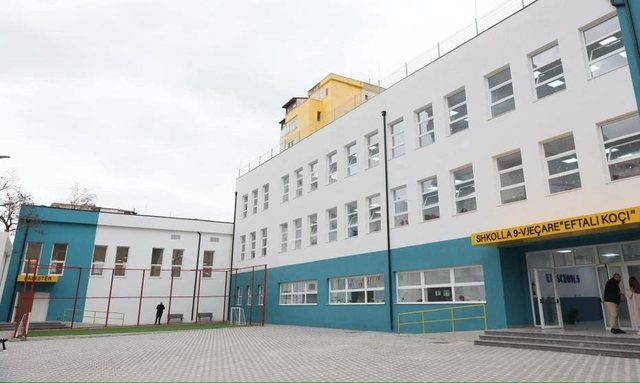
When Durrës' education system faced a health crisis in December 2024, hundreds of parents and students felt unsafe and misinformed.
Within a short time, two students from the “Leonik Tomeo” and “Kushtrimi i Lirisë” schools were infected with acute meningitis – a dangerous disease that infects the membranes of the brain and spinal cord. As a result, a 17-year-old high school student from the “Leonik Tomeo” school lost her life.
The situation caused panic among parents and students, while the delayed response of educational and health institutions worsened the situation.
"When I took my child to school, trusting the school, he found himself alone in an empty classroom," recalls Oriola Tufa, mother of two children, one of whom studies at the "Kushtrimi i Lirisë" school.
"We expected a reaction from the school and Public Health authorities as well as the disinfection of the facilities, but the information was kept secret. As a parent, I demand responsibility and care for the health of my children and every other child," she added.
The main demand of the parents was the disinfection of the schools, but this was only achieved in four of them and at a time distance from each other. Instead of reacting, the health and education authorities tried to minimize the parents' concern, giving limited and vague statements. This only increased the feeling of uncertainty and worsened the situation, leading to a halving of school attendance for weeks.
Data obtained by BIRN shows that the situation could not be managed due to a lack of communication and cooperation between education institutions and local government institutions.
Lindita Muhedini, head of the Economic Education Center in the municipality of Durrës, stated at the time that 13 public kindergartens with dormitories and 5 nurseries were disinfected, due to the significant lack of children. But she added that the Center did not receive any request from education and health officials to disinfect schools, despite the continuous request from parents. As a result, only four schools were disinfected.
The lack of a quick response increased panic among parents and temporarily emptied schools of students.
"I kept my daughter at home for 15 days just for this reason. Parents on social media said that disinfection had been done, but we haven't seen any evidence. There is more a lack of information and cooperation with each other," said the father of a primary school student at the "Kushtrimi i Lirisë" school.
"If the administration doesn't respond, we as parents will do it. We are making every effort for the children," he added.
Another parent, Qerime Rudi, told BIRN that to ease the worry, they were forced to vaccinate their children and change their granddaughter's school.
"We vaccinated the children because we were afraid. We couldn't bring them to school. We changed our granddaughter's school out of fear and lack of measures. All the parents were asking for it, but we didn't understand why the disinfection wasn't done," Rudi added.
The principal of one of the disinfected schools told BIRN on condition of anonymity that the situation returned to normal only after she insisted on disinfecting the school.
"There were over 50% absences in the classroom. I didn't hesitate as soon as they told me about disinfection. This was a measure that calmed everyone down and restored normality to the learning process," she said.
Acute meningitis is a rare disease and according to the Institute of Public Health, seven cases have been identified over the last five years, of which only five have been confirmed.
Referring to the case in Durrës, the IHP says that all appropriate measures were taken and that the cases were limited.
"...In Durrës, only 2 cases of meningococcal meningitis have been reported and there have been no other cases reported, while viral infections have been present as in every season," stated the IHP.
But for mental health workers, the lack of transparency and responsiveness has undermined parents' trust in educational institutions.
"When a child is diagnosed with this disease, the parent community reacts with panic and a sense of helplessness. Bacterial meningitis is infectious, requiring a rapid response from educational and health institutions. Above all, information and action," says Armela Bejko, clinical psychologist.
"The refusal to disinfect school premises not only fueled social revolt, but also worsened the psychological impact on children and parents," she added, stressing that poor management of the situation aggravated the situation more than necessary. Reporter.al
Latest news




Food safety scandal: Tirana AKU director dismissed
2025-04-07 12:06:12
2.9 million liters of palm oil milk were imported to Albania in 2024
2025-04-07 11:59:05
Berisha pledges to EPP: Zero tolerance towards crime
2025-04-07 11:46:10


Residents of Tropoja and Has block the Qafë Prushi border crossing
2025-04-07 11:20:48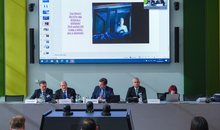

Albania ranks first in the Western Balkans for human trafficking
2025-04-07 10:57:21
Photo/ This is the 52-year-old Albanian man killed in Italy
2025-04-07 10:48:32
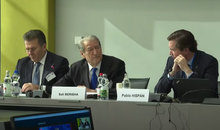
Berisha starts tour in Strasbourg
2025-04-07 10:30:19
Requested revocation of security measure, decision made for Kryemadhi
2025-04-07 10:20:59
Strasbourg Court questions courts' decision on Beleri case
2025-04-07 10:11:37
Ballots to be used by the diaspora arrive in Albania
2025-04-07 10:02:24
52-year-old Albanian man shot dead in Italy
2025-04-07 09:51:43
Names/ Two people extradited from Germany and Italy
2025-04-07 09:40:17
Berisha's 'non-grata', Këlliçi: It's already been removed, don't you know yet?
2025-04-07 09:32:51
The Head of Public Procurement appears at SPAK
2025-04-07 09:20:55
Veliaj's attack campaign from prison undermines 'public trust in the media'
2025-04-07 09:13:43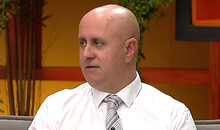
Vaccines: Conspiracy or protection of life?
2025-04-07 09:05:40

Foreign exchange, how much foreign currencies are sold and bought today
2025-04-07 08:39:40
Horoscope, what do the stars have in store for you today?
2025-04-07 08:25:31
Alternating clear and cloudy skies, temperatures drop
2025-04-07 08:14:42
Morning Post/ In 2 lines: What mattered yesterday in Albania
2025-04-07 07:59:15
Snowfall blocks Struga-Qafthanë axis, about 1 km of vehicle queue
2025-04-06 21:50:50

"Virtual clashes" that could lead to inter-institutional tensions
2025-04-06 21:06:12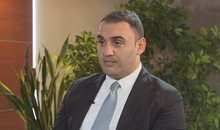
Këlliçi: DP will secure 80% of Albanian votes in the US
2025-04-06 20:46:30
Topalli from London calls on Albanians: May 11 is our chance to change reality
2025-04-06 20:27:01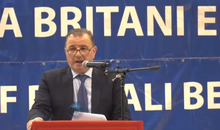

Veliaj's wiretaps/ 13 pages from SPAK's file with blackmail from the cell
2025-04-06 19:47:39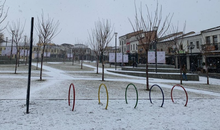
Temperatures drop, snowfall returns to the Southeast
2025-04-06 19:25:20
“Petulla” me honey and BE
2025-04-06 19:07:42

Strazimir: In Albania you are arrested and released only if you want Alexi
2025-04-06 18:20:30

Iran rejects talks with US over nuclear program
2025-04-06 17:40:47



The operation to capture Eljon Hato, Ervis Martinaj's friend, fails
2025-04-06 16:23:52
The big cat, abandoned and forgotten in a small asylum...
2025-04-06 16:02:24




Even peppers with pesticides, Croatia returns Albanian products
2025-04-06 14:40:33

Rain and snowfall, police appeal to drivers: Be careful on the road!
2025-04-06 14:02:30

Caused pollution of Dhrale Bay, technical engineer arrested in Palasa
2025-04-06 13:23:26
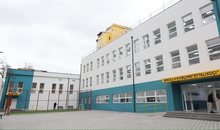
BIRN: Health crisis in Durrës undermines parents' trust in the education system
2025-04-06 12:36:52


Berisha: Elbasan, evidence of one of the biggest thefts of the century
2025-04-06 11:31:51

"Don't trust anyone," the US embassy warns Albanians about visas
2025-04-06 10:50:49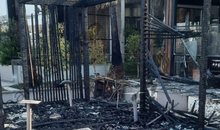
Bar gutted by flames overnight in Tirana
2025-04-06 10:27:37
Trump tariffs, job losses in UK car industry inevitable
2025-04-06 10:07:37
Chicken with salmonella, SP MP gives ridiculous excuse: It happens everywhere
2025-04-06 09:43:23
Protest in Pristina against electricity increase
2025-04-06 09:10:52
Foreign exchange, April 6, 2025
2025-04-06 09:03:12
What do the stars predict for you today?
2025-04-06 08:38:04
Weather today, Sunday is forecast to be unsettled
2025-04-06 08:14:49
Morning Post/ In 2 lines: What mattered yesterday in Albania
2025-04-06 08:00:59

Aksident në Tepelenë, shoferi humb kontrollin e makinës dhe del nga rruga
2025-04-05 21:20:36
U aksidentua nga makina, humb jetën 65-vjeçarja në Korçë
2025-04-05 21:02:27
Berisha: Nuk do ketë pensionist që të firmosë pension nën 200 euro
2025-04-05 20:41:25



"Vote for Iiir Metaj", Kryemadhi in support of the PL leader
2025-04-05 19:31:46
Berisha: We will establish the lowest tax system, the water bill will be halved
2025-04-05 19:13:44

Accident in Korça, car hits pedestrian, perpetrator flees the scene
2025-04-05 18:31:29


Durrës/ 16-year-old hits pedestrian to death
2025-04-05 17:46:54





Kaja Kallas visits the Western Balkans next week
2025-04-05 15:59:34

Two cars collide in Durrës, one of the drivers suffers head injuries
2025-04-05 15:25:45



Russia sends representatives to US for talks for first time
2025-04-05 14:15:28
Video/ Manastirliu confronts the youth in unit No. 9: Long live Sali Berisha
2025-04-05 13:56:45

Waterworks employee in Saranda loses his life at work
2025-04-05 13:26:57
